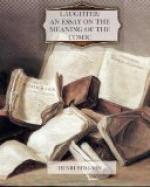You will at once think of an equivocal situation. And the equivocal situation is indeed one which permits of two different meanings at the same time, the one merely plausible, which is put forward by the actors, the other a real one, which is given by the public. We see the real meaning of the situation, because care has been taken to show us every aspect of it; but each of the actors knows only one of these aspects: hence the mistakes they make and the erroneous judgments they pass both on what is going on around them and on what they are doing themselves. We proceed from this erroneous judgment to the correct one, we waver between the possible meaning and the real, and it is this mental seesaw between two contrary interpretations which is at first apparent in the enjoyment we derive from an equivocal situation. It is natural that certain philosophers should have been specially struck by this mental instability, and that some of them should regard the very essence of the ludicrous as consisting in the collision or coincidence of two judgments that contradict each other. Their definition, however, is far from meeting every case, and even when it does, it defines—not the principle of the ludicrous, but only one of its more or less distant consequences. Indeed, it is easy to see that the stage-made misunderstanding is nothing but a particular instance of a far more general phenomenon,—the reciprocal interference of independent series, and that, moreover, it is not laughable in itself, but only as a sign of such an interference.
As a matter of fact, each of the characters in every stage-made misunderstanding has his setting in an appropriate series of events which he correctly interprets as far as he is concerned, and which give the key-note to his words and actions. Each of the series peculiar to the several characters develop independently, but at a certain moment they meet under such conditions that the actions and words that belong to one might just as well belong to another. Hence arise the misunderstandings and the equivocal nature of the situation. But this latter is not laughable in itself, it is so only because it reveals the coincidence of the two independent series. The proof of this lies in the fact that the author must be continually taxing his ingenuity to recall our attention to the double fact of independence and coincidence. This he generally succeeds in doing by constantly renewing the vain threat of dissolving partnership between the two coinciding series. Every moment the whole thing threatens to break down, but manages to get patched up again; it is this diversion that excites laughter, far more than the oscillation of the mind between two contradictory ideas. It makes us laugh because it reveals to us the reciprocal interference of two independent series, the real source of the comic effect.




